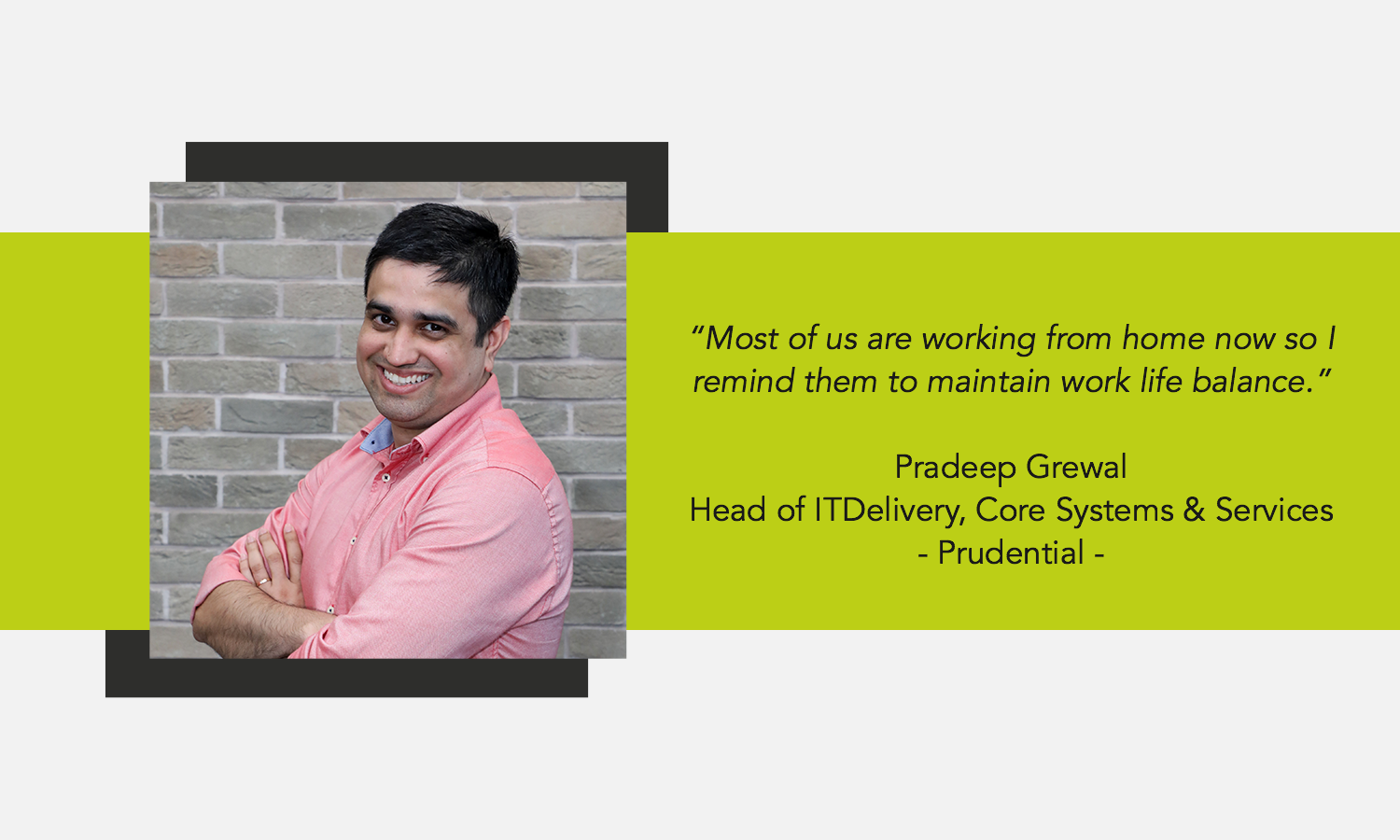What should you do if your role could be affected by rapid digitalisation of your industry? Take that a step further and imagine… … if you were a team leader, responsible for the professional development and advancement of your team, how can you ensure that your team continues to stay relevant and is future ready in this digital age?
That was the exact challenge that Pradeep Grewal (Head of ITDelivery, Core Systems & Services) faced a year ago. But he wasn’t content to simply react to digital disruption, he had to stay one step ahead and ensure that they were equipped with skills that would help them stay relevant and add value to the work that they do.
For his team of Quality Assurance (QA) specialists at Prudential, Pradeep identified automation as the technology that would have the most impact on their roles—traditional QA testing entails a lot of manual and repetitive work, and automation could easily do those tasks faster and with better accuracy.
Pradeep saw automation as an enabler—by freeing up his team from the manual aspects of QA testing, automation would give them the opportunity to take on higher-level tasks related to strategy and problem-solving. But in order to do so, they would need new skills in analytics, coding, and engineering.
So when the team approached their HR about training, they were introduced to the Professional Conversion Programme (PCP). And that’s how Pradeep and his six team members embarked on their upskilling journey from QA testers to QA Test Automation Engineers and Business Analysts.

Success from persity
Upskilling as a team is not without its unique challenges. First, it was important that everyone on the team had complementary, not identical, skills.
Pradeep decided on two tracks for his team: Test Automation Engineer and Test Automation Business Analyst. But who would be skilled in which? They solved this by discussing things together—each member decided on a specialisation based on how it would expand on their existing interests and strengths.
Jason CW Ho (Test Automation Egnineer), a member of Pradeep’s team who is on the engineering track, already had a personal interest in automation and had taught himself how to use frameworks like Selenium and Appium. It therefore came as a natural progression that he would pick up more engineering and programming skills through courses like Fundamentals of Test Automation to help script Prudential’s automation software and make QA testing more efficient for all.
On the other hand, Alia Sidek (Test Automation Business Analyst) , who is on the analyst track, had an interest in the further-reaching business benefits of automation in QA. “We already have Business Analysts within the company, but we don't have someone who has a perspective from a quality assurance or user acceptance testing (UAT) side,” she shares. “So, what I can do is give a point of view which nobody else has and ensure that QA and UAT issues are taken into consideration in the early stages of any project development throughout the company.”
Jason and Alia both started as QA Specialists with roughly the same job scope. But now, their paths have persified.

And it’s paying off—Jason is highly motivated, enjoys his training, and can’t wait to immediately apply the theory he’s learnt to real-life business scenarios. “I find my training very fruitful and enjoyable because the results are tangible—I’m actually putting whatever I learn into use right away,” he shares. “This is something that gives me motivation because I’m picking up skills that are highly business relevant.”
Similarly, Alia is excited to pick up more soft skills through courses like Stakeholder Engagement and Negotiation to complement her existing business knowledge and make her a better Business Analyst.
“Besides having learnt new skills, I’m gratified to see the great results from adopting automation, and knowing that it’s our team that made it happen.”
“I’ve also bonded with the other Business Analysts, and we often share our ideas on how to make the experience better for both our end users and our colleagues. So it has indeed been a very fruitful journey for me,” she shares.
The team that upskills together, wins together
The second challenge of upskilling as a team has to do with time management. Pradeep had to manage his team’s schedule well to ensure minimal disruption to their work and productivity while they were undergoing training.
Everyone on the team stepped up—they knew that they were on this upskilling journey together, so when someone had to step away to attend classes, the others would rally and support them by picking up their work and covering their assignments.
The team supports each other in day-to-day assignments as well. They’re constantly in touch while working from home, sharing learnings, overcoming challenges, and brainstorming solutions. “We constantly communicate with each other on any issues we face. When we put our heads together, we can easily come up with solutions to make things work,” Jason says.
Pradeep also believes in the power of consistently communicating with his team. He checks in on his team regularly and ensures that they are progressing well and on track with their training. He also ensures they are able to juggle both work and training.

“Most of us are working from home now so I remind them to maintain work life balance.” Pradeep shares. “Sometimes, they might get too engrossed in finishing their tasks or trying to come up with innovative solutions that would help to improve the workflow before they go to bed. I have told them that if they need help, I’m always ready to step in.”
To Pradeep and his team, there is no “my success” or “your success”—only “our success”. While everyone’s PCP experience may be unique, their collective end-goal remains the same: to leverage each other’s unique strengths to build a better, more effective team. And Jason and Alia agree that undergoing PCP together was a definite bonding experience, and they’re more close-knit today than ever.
Upskilling: an investment that benefits all
Similarly, other teams who want to succeed in getting the most out of PCP need to have the view that upskilling doesn’t just benefit the inpidual—it benefits everyone from the team to the company to the consumer.

“As analysts, we are always coming up with ideas on how to make better use of automation that will benefit Prudential’s customers and financial consultants,” Alia shares. “All our systems enhancements on the back end speed up processes like underwriting, approval of claims, enforcement of policies, and more.”
And within a short period of time, the team has already seen a vast improvement in UAT. The positive effects of this will ripple out across the organisation, improving processes, operations, customer satisfaction, and more.
As a strong advocate of future-readiness, Pradeep hopes that more team leaders will embrace the digital transformation of their industries and adapt ahead of time. More importantly, he believes organisations should have a long-term view of training and education as an investment for the future.
“As the economy evolves and the ways we work evolve, we have to get our employees and our colleagues to also evolve, stay relevant and be future ready.”
After all, human capital is an asset, and it’s much more efficient to fill a skills gap by upskilling. Pradeep and his team are grateful to be with an organisation like Prudential, which has a culture that values talent development and continual upskilling.
If you’re a team leader who wishes to upskill your team in digital skills, or an inpidual who’s keen to reskill for a tech-oriented role in the financial services industry, reach out to your HR to find out more about PCP and find out if you’re eligible to participate.

This article is part of a series of stories on PMETs who have gone through an upskilling or reskilling transformation journey within the banking and finance industry.
(Information in this article are accurate as at time of publication, August 2021)
.png?sfvrsn=7a1194d1_1)
 Overview
Overview















.png?sfvrsn=86556ebb_1)
.png?sfvrsn=a8212bcc_1)
.png?sfvrsn=858c63d1_1)
2b4307cf-e91f-4368-ac62-cf234d6d2b1c.png?sfvrsn=212575fd_1)